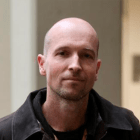
The first LSD trip in 1943 was a bumpy ride.
Swiss chemist Albert Hofmamn accidentally ingested a massive dose of the untested substance and then cycled home from his lab as the drug started to kick in. He felt like he was losing his mind and then as though he had actually died. After several hours of terror, however, something miraculous happened.
“I had the feeling of coming back from a very strange land, home to our everyday reality,” he would later recall. “And it was a very, very happy feeling and a very beautiful experience.”
The next day the feeling endured and deepened. “I had the feeling that I saw the earth and the beauty of nature as it had been when it was created”.
Over the past decade it’s been fairly well established that psychedelics in the appropriate context can be dramatically therapeutic. Dozens of studies have invariably shown that guided psychotherapy sessions supplemented with psychedelics such as psilocybin (the psychedelic ingredient in magic mushrooms) or MDMA can lead to radical improvements for people suffering through depression, anxiety, PTSD and addiction.
Hofmann’s conviction that psychedelics bring users closer to nature is a trippers’ trope that’s easy to dismiss as woozy utopianism. Lately, however, a few clinical studies suggest that not only is there a statistically significant connection between psychedelic use and increased connection to nature, but that it lasts after the drug wears off, leading to pro-environmental behaviour.
A 2017 study found that a history of psychedelic use was strongly associated with an increased sense of nature-connectedness, determined by questionnaire responses to 21 statements such as “I take notice of wildlife wherever I am” and “I feel very connected to all living things and the earth”. Participants who had used psychedelics were also found to engage more frequently in ecological activity such as activism, recycling and reducing their carbon footprint.
The following year a small study from Imperial College, London, showed a significant increase in nature-relatedness one week after a high dose of psilocybin administered in a day-long clinical session with therapeutic support. One year later the shift was still enduring (as was a corresponding finding of reduced authoritarian political views).
The strongest evidence yet came out just last month, again from Imperial College. Six hundred and fifty people were surveyed about their self-described connection to nature before and after a psychedelic trip. Nature-relatedness was significantly increased both in the weeks afterwards and up to two years subsequent. The study notes that the extent of this increased connection to the natural world also correlated with increased well-being, reduced anxiety and a greater sense of meaning and vitality.
Study author Dr Sam Gandy explains there is a well-established link between subjective nature connection and both psychological health and ecological engagement. “I think we’ve built up a strong scientific case that this is something interesting and important,” he told Crikey by phone.
“We’ve got this mental health crisis in the western world, and we’ve got this concurrent ecological crisis, and it stems from a growing disconnection. Having an intellectual understanding of something is very different from having an experiential, emotional connection. Psychedelics are much more geared towards this experiential connection to nature, this felt sense of being part of it.”
Studies using psilocybin in clinical therapy have shown that the psychedelic dramatically increases people’s sense of connection to the world around them but also to other people and their own sense of self. Unusually, it also leads to an increasing in the personality trait of openness, generally held to be a relatively fixed condition.
Gandy explains nature-relatedness as one function of this more general connection and openness, and notes that the degree of all three is strongly correlated with the sense of ego dissolution that characterises many profound trips.
“This relaxing of the boundaries between the self and the world leads people to identify with and relate more strongly to their environment.”
Quite how one can employ such tools is less obvious. Gandy notes anecdotal cases of people investing in rewilding and conservation projects following psychedelic experiences. Extinction Rebellion co-founder Gail Bradbrook credits a psychedelic retreat with inspiring the creation of the movement.
A recent Swiss study gave patients therapy sessions with mushrooms in an alpine retreat setting, but a more comprehensive program seems a long way off. Although mushrooms have been declared a breakthrough therapy by US and European regulators and have been decriminalised in several US cities in recent months, it will still be years before they are approved even for medical use.
“It’s a depressingly long timeframe,” Gandy agrees. “Things can move pretty slowly in the scientific world but conducting this research is not without its major challenges.”
With the world on fire and ecological anxiety gripping the western mind, his study concludes with some arch but ambitious advice for policy-makers:
“Given the demonstrated capacity of psychedelics to oppose this pervasive environmental melancholia by enhancing human-nature relatedness, it would seem their widespread prohibition is not in the best interests of our species, or the biosphere at large.”








Becoming aware of the world around you is called ‘environmental science’.
Now this creates problems for those whose wealth and power are dependent on ignoring the environment in their eternal quest for even more of that of which they already have significant excess.
Centuries of indoctrination by the forces of commerce, politics and religions have created the narrow concepts of existential reality upon which they rely for cooperative behaviour by the hoi polloi.
Creating awareness of the delusions to which they have been subjected through the generations is counter productive to the aims and purposes of the top-end-of-town; hence the vitriolic condemnation of mind-freeing psychedelics and the continuing promotion of the brain destroying alcoholic culture which besets our society.
LSD turns people Green? Which Newscorp publication and journalist will be the first to make whoopee with this finding.
Just replace “latte sipping” with “LSD tripping” greenies, and regurgitate all the old stuff. Job done, especially for the chronically brainwashed, uninformed, misinformed, gullible, victims of the Dunning Kruger syndrome, of whom larger and larger numbers can be found, as our mass-media continues the onslaught. The increasing sophistication of our technologies, ever more difficult to understand, contributes its bit to the D-K syndrome of the unwary. A nice recipe for the continued election of the kleptocracy that runs not only this, but many other countries by now.
“Hofmann’s conviction that psychedelics bring users closer to nature is a trippers’ trope that’s easy to dismiss as woozy utopianism.”
Ha yeah, except it isn’t. 50 years later and the medical and scientific community are just opening their eyes.
I’ve often thought a major dose to the world’s water supplies would solve most of our political problems, and consequently all other issues.
This ‘otherness’ and disconnectedness from each other and the world around us might be called a personal bubble. ScoMo is a perfect manifestation of this personal bubbledom, nothing getting in, nothing coming out and no concept or recognition or connection with any other.
This is actually my politics, I am less left or right than I am connected, wholly and always. All other states of mind are juvenile steps towards the fulfillment of the promise of adulthood. The bodies grow but the mind stays in this pupae stage, and due to the lack of connection with the other they never understand their unrealized state.
Sad.
Without disagreeing with anything you’ve written there DB, collectivism is quite literally a “leftist” trait. The disconnectednness/estrangement from the political right is of course other matter entirely.
For some further reading, I suggest John Allegro’s “Sacred Mushroom & the Cross” though cloyingly religious so maybe Andrija Puharich’s “Sacred Mushroom – Key to the Door of Eternity” except that the test subject was… um Uri Geller.
At least he learned a profitable trade – prestidigitation.
No ownder the Establishment fears psychadelics.